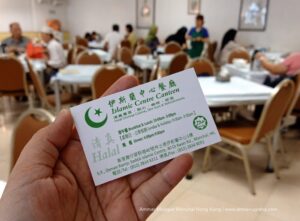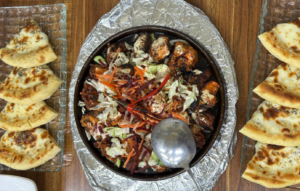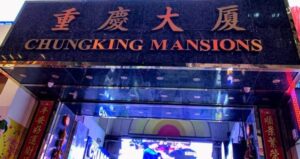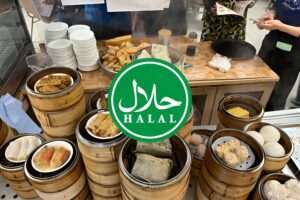 Hong Kong is ambitiously transforming into a leading hub for halal tourism and the halal food industry. This initiative, driven by government efforts and local entrepreneurs, aims to tap into the rapidly growing global halal market, projected to reach USD 3 trillion by 2028. This transformation is not just about expanding menu options or providing prayer facilities; it represents a comprehensive approach to cultural inclusivity and economic diversification.
Hong Kong is ambitiously transforming into a leading hub for halal tourism and the halal food industry. This initiative, driven by government efforts and local entrepreneurs, aims to tap into the rapidly growing global halal market, projected to reach USD 3 trillion by 2028. This transformation is not just about expanding menu options or providing prayer facilities; it represents a comprehensive approach to cultural inclusivity and economic diversification.
Halal tourism involves providing travel experiences adhering to Islamic principles, including halal-certified food, prayer facilities, and culturally sensitive accommodations. With the global Muslim population on the rise, the demand for such travel experiences is significant. This shift presents a substantial opportunity for destinations like Hong Kong to attract Muslim travelers and foster a more inclusive tourism sector.
In recent years, Hong Kong’s government, alongside community leaders such as Vincent Cheng from the DAB Ethnic Minorities Standing Committee, has been enhancing the city’s appeal to Muslim travelers. Supported by the Incorporated Trustees of the Islamic Community Fund of Hong Kong (BOT), these efforts underscore a commitment to transforming Hong Kong into a top choice for Muslim tourists.
Chief Executive John Lee Ka-chiu emphasizes the importance of developing Hong Kong’s halal tourism sector. Initiatives include offering Arabic information at airports and encouraging hotels to install prayer facilities. These efforts aim to create a welcoming environment for Muslim visitors, recognizing the economic and cultural benefits of becoming a more Muslim-friendly city.
 Hong Kong currently boasts 142 halal-certified restaurants, a promising number for a city renowned as a culinary destination. However, there is still a need for a more accessible halal certification system. The existing process, overseen by the BOT, is often considered stringent, deterring many restaurants from seeking certification. The government’s plan to streamline the certification scheme by 2025 aims to balance accessibility with adherence to Islamic dietary laws.
Hong Kong currently boasts 142 halal-certified restaurants, a promising number for a city renowned as a culinary destination. However, there is still a need for a more accessible halal certification system. The existing process, overseen by the BOT, is often considered stringent, deterring many restaurants from seeking certification. The government’s plan to streamline the certification scheme by 2025 aims to balance accessibility with adherence to Islamic dietary laws.
Halal food production involves a detailed supply chain, including sourcing, transportation, storage, and slaughter, each requiring strict compliance with Islamic principles. For instance, halal meat must be derived from animals slaughtered according to specific guidelines, and ingredients must be free from prohibited substances like pork or alcohol. This scrutiny necessitates a comprehensive approach to supply chain management, which Hong Kong must master to become a trusted halal food destination.
Looking to regional neighbors for inspiration, Hong Kong can learn from Malaysia and Singapore. Malaysia’s well-established halal certification system covers food, cosmetics, and pharmaceuticals. Singapore has positioned itself as a halal food hub by creating dedicated industrial parks for halal production. These examples highlight the importance of government support and strategic infrastructure development in nurturing a thriving halal ecosystem.
The Hong Kong government’s role is crucial. Beyond certification, financial incentives are needed to encourage halal options. The proposal for a halal restaurant certification subsidy scheme is a promising start. Creating dedicated halal sections at major events and food expos could also increase visibility and attract businesses. Collaborating with the Hong Kong Trade Development Council to expand halal sections at trade exhibitions could boost industry participation and international interest, supporting local businesses and signaling Hong Kong’s commitment to becoming a halal-friendly destination.
 The hospitality sector also plays a significant role. By providing more Muslim-friendly services such as prayer rooms and qibla indicators, hotels can enhance Hong Kong’s appeal to Muslim travelers. This should be complemented by training programs for tourism professionals, equipping them with the knowledge and sensitivity to cater to Muslim visitors effectively. The Hong Kong Tourism Board can promote the city’s growing halal food scene by creating a centralized database of halal-friendly establishments and developing Muslim-focused travel itineraries.
The hospitality sector also plays a significant role. By providing more Muslim-friendly services such as prayer rooms and qibla indicators, hotels can enhance Hong Kong’s appeal to Muslim travelers. This should be complemented by training programs for tourism professionals, equipping them with the knowledge and sensitivity to cater to Muslim visitors effectively. The Hong Kong Tourism Board can promote the city’s growing halal food scene by creating a centralized database of halal-friendly establishments and developing Muslim-focused travel itineraries.
Hong Kong’s Muslim community, while small at about 2% of the population, is diverse and well-established. The Kowloon Mosque and Islamic Centre in Tsim Sha Tsui stands as a testament to the long-standing presence of Islam in the city. The local Muslim population, comprising Chinese Muslims, Indonesian domestic workers, and expatriates from South Asia and Arab countries, provides a foundation for building the halal food industry.
Developing the halal sector offers benefits beyond attracting tourists. It opens new avenues for economic growth, creates jobs, and enhances Hong Kong’s reputation as a truly global city catering to diverse needs. Moreover, it better serves the local Muslim community, improving their quality of life and sense of belonging. Education and training will play a pivotal role. Universities should offer courses on halal production and supply chain management, while public awareness campaigns can broaden understanding of halal principles. This educational approach supports industry growth and fosters greater cultural understanding.
As Hong Kong embarks on this journey, it must navigate several challenges. Limited space and high costs may make it difficult for restaurants to maintain separate halal kitchens. Resistance from those unfamiliar with halal concepts or concerned about changes to the food culture may also exist. To address these challenges, open dialogue with the community is essential, highlighting the benefits of halal cuisine. Innovative solutions, such as shared halal kitchen spaces, could help smaller businesses enter the halal market without prohibitive costs.
The potential economic impact of this initiative is substantial. The global halal food market will reach $3 trillion by 2028. By positioning itself as a halal hub, Hong Kong could tap into this lucrative market, attracting tourists, investors, and businesses expanding their halal operations in Asia. Hong Kong’s strategic location as a gateway to mainland China makes it ideal for halal companies entering the Chinese market, potentially developing a halal food export industry and diversifying the economy.
 Hong Kong’s logistics and finance strengths could support the halal sector’s growth. World-class port facilities and efficient supply chain systems could be adapted for halal transportation and storage. Meanwhile, the financial services industry could develop specialized products and services, such as Islamic finance options for halal businesses. As halal dim sum begins to waft through the streets, it heralds a culinary revolution and a new chapter in Hong Kong’s history as a global crossroads of culture and commerce.
Hong Kong’s logistics and finance strengths could support the halal sector’s growth. World-class port facilities and efficient supply chain systems could be adapted for halal transportation and storage. Meanwhile, the financial services industry could develop specialized products and services, such as Islamic finance options for halal businesses. As halal dim sum begins to waft through the streets, it heralds a culinary revolution and a new chapter in Hong Kong’s history as a global crossroads of culture and commerce.
Hong Kong must enhance its awareness of halal principles to cement its position as a halal hub. Universities should incorporate courses on halal production, supply chain management, and Islamic finance. Public awareness campaigns can foster an environment of inclusivity and respect. Innovation will be key to overcoming space and cost challenges. Shared halal kitchen spaces, where multiple businesses operate within a certified environment, could be explored. Partnerships between halal and non-halal establishments might also be beneficial, allowing resource sharing and reducing costs.
The government and industry stakeholders should maintain an open dialogue with the community to address concerns about halal practices. Highlighting halal cuisine’s economic and cultural benefits can shift public perception and foster a more inclusive society. The potential economic benefits extend beyond tourism and local consumption. Establishing a halal food hub can position Hong Kong as a pivotal player in the global halal supply chain, attracting international businesses and investors. This can lead to job creation, increased investment, and a more robust economy. Additionally, Hong Kong’s strategic position as a gateway to mainland China offers unique opportunities for halal companies entering the Chinese market. Establishing a robust halal export industry could further reinforce Hong Kong’s status as a major player in the global market.
 Hong Kong’s well-established logistics and finance sectors provide a solid foundation for supporting the halal industry’s growth. World-class port facilities and advanced supply chain systems can be tailored for halal transportation, ensuring compliance with strict standards. Moreover, the financial services industry can offer innovative solutions, such as Islamic finance options, to support halal businesses.
Hong Kong’s well-established logistics and finance sectors provide a solid foundation for supporting the halal industry’s growth. World-class port facilities and advanced supply chain systems can be tailored for halal transportation, ensuring compliance with strict standards. Moreover, the financial services industry can offer innovative solutions, such as Islamic finance options, to support halal businesses.
As Hong Kong embraces this new chapter, the culinary landscape is set to evolve. Introducing halal dim sum and other local specialties offers Muslim travelers a unique taste of Hong Kong’s rich culinary heritage while respecting their dietary requirements. This fusion of traditional and halal cuisines enriches the local food scene and strengthens Hong Kong’s reputation as a global crossroads of culture.
Through strategic planning and collaboration, Hong Kong is poised to capture a significant share of the global halal market and establish itself as a leading destination for Muslim travelers and investors. As these efforts come to fruition, Hong Kong will boost its economy and international standing while creating a more inclusive and culturally rich environment for all residents and visitors. This journey towards becoming a halal hub marks a significant milestone in Hong Kong’s evolution as a vibrant, dynamic, and globally connected city.
Moreover, the potential for high-value partnerships and collaborations is immense. Hong Kong can collaborate with countries that have established halal sectors to exchange knowledge and best practices. Such alliances could involve joint ventures in halal food production, research, innovation, and developing halal tourism packages that attract a wider audience.
 Promoting halal events, such as food festivals and cultural fairs, can serve as platforms to showcase Hong Kong’s halal offerings while educating the public about Islamic culture and traditions. These events can attract residents and international visitors, further solidifying Hong Kong’s position as a global halal destination.
Promoting halal events, such as food festivals and cultural fairs, can serve as platforms to showcase Hong Kong’s halal offerings while educating the public about Islamic culture and traditions. These events can attract residents and international visitors, further solidifying Hong Kong’s position as a global halal destination.
Sustainability could also be a key focus in developing the halal sector. Emphasizing sustainable and ethical practices in halal food production can appeal to environmentally conscious consumers and set Hong Kong apart as a leader in responsible tourism and culinary practices.
Technology integration will be crucial in streamlining halal certification processes and supply chain management as the city evolves. Leveraging digital platforms and blockchain technology can enhance the halal food industry’s transparency, traceability, and efficiency. This technological advancement can build trust among consumers and stakeholders, ensuring that halal standards are consistently met and maintained.
The impact of these initiatives is expected to resonate beyond the immediate economic and cultural benefits. By fostering a more inclusive and diverse environment, Hong Kong can strengthen its social fabric and promote unity among its residents. This inclusivity can create a more harmonious society where different cultures and traditions are celebrated and respected.
Through strategic planning and collaboration, Hong Kong is poised to capture a significant share of the global halal market and establish itself as a leading destination for Muslim travelers and investors. As these efforts come to fruition, Hong Kong will boost its economy and international standing and create a more inclusive and culturally rich environment for all its residents and visitors. This journey towards becoming a halal hub marks a significant milestone in Hong Kong’s ongoing evolution as a vibrant, dynamic, and globally connected city.
Furthermore, educational initiatives will be crucial in supporting this transformation. By offering specialized courses in halal food production, supply chain management, and Islamic finance, academic institutions can prepare the next generation of professionals to thrive in this expanding industry. This focus on education will support the understanding and implementation of halal standards and promote greater cultural awareness and respect within the broader community.
Integrating cutting-edge technology will also be pivotal in advancing the halal sector. Implementing digital solutions, such as blockchain for transparent supply chain tracking and mobile applications for halal certification, can enhance the efficiency and credibility of halal practices. These innovations will help ensure that halal standards are consistently met, fostering trust among consumers and industry stakeholders.
Hong Kong can explore establishing dedicated halal industrial zones to further bolster its position. These zones would provide the necessary infrastructure and resources for halal food production, enabling businesses to operate efficiently and meet the growing demand for halal products. Hong Kong can attract international investments and stimulate local entrepreneurship by creating a supportive environment for halal enterprises.
Collaboration with international organizations and countries with established halal industries can facilitate the exchange of knowledge and best practices. Joint ventures, research partnerships, and cultural exchange programs can enrich Hong Kong’s halal offerings and strengthen its position as a global leader in halal tourism and food production.
The development of halal tourism packages tailored to Muslim travelers can further enhance Hong Kong’s appeal as a destination. These packages could include guided tours of halal-certified restaurants, visits to cultural and religious sites, and participation in halal events and festivals. By curating unique and culturally enriching experiences, Hong Kong can attract a diverse range of Muslim tourists seeking meaningful travel experiences.
As Hong Kong continues its journey to becoming a halal hub, it is essential to maintain an open dialogue with the community. Engaging with residents, businesses, and cultural organizations can ensure that the halal transformation is inclusive and respectful of the city’s diverse cultural landscape. By fostering understanding and cooperation, Hong Kong can create an environment where different cultures thrive together.
The economic impact of this transformation is poised to be substantial. By tapping into the global halal market, Hong Kong can attract investments, create jobs, and stimulate economic growth. Establishing a halal food export industry can further diversify the economy and strengthen Hong Kong’s position as a major player in the global market.
In conclusion, Hong Kong’s ambitious plan to become a global halal hub is a testament to its commitment to cultural inclusivity, economic diversification, and global competitiveness. Through strategic initiatives, education, innovation, and collaboration, Hong Kong is poised to capture a significant share of the global halal market and establish itself as a leading destination for Muslim travelers and investors. As these efforts unfold, Hong Kong will enhance its tourism industry and halal food sector and foster a deeper cultural understanding and appreciation within its diverse community. This journey marks a significant milestone in Hong Kong’s evolution as a vibrant, dynamic, and globally connected city.

President, The Asian Club Limited
General Secretary, China Bangladesh Friendship Center-CBFC
